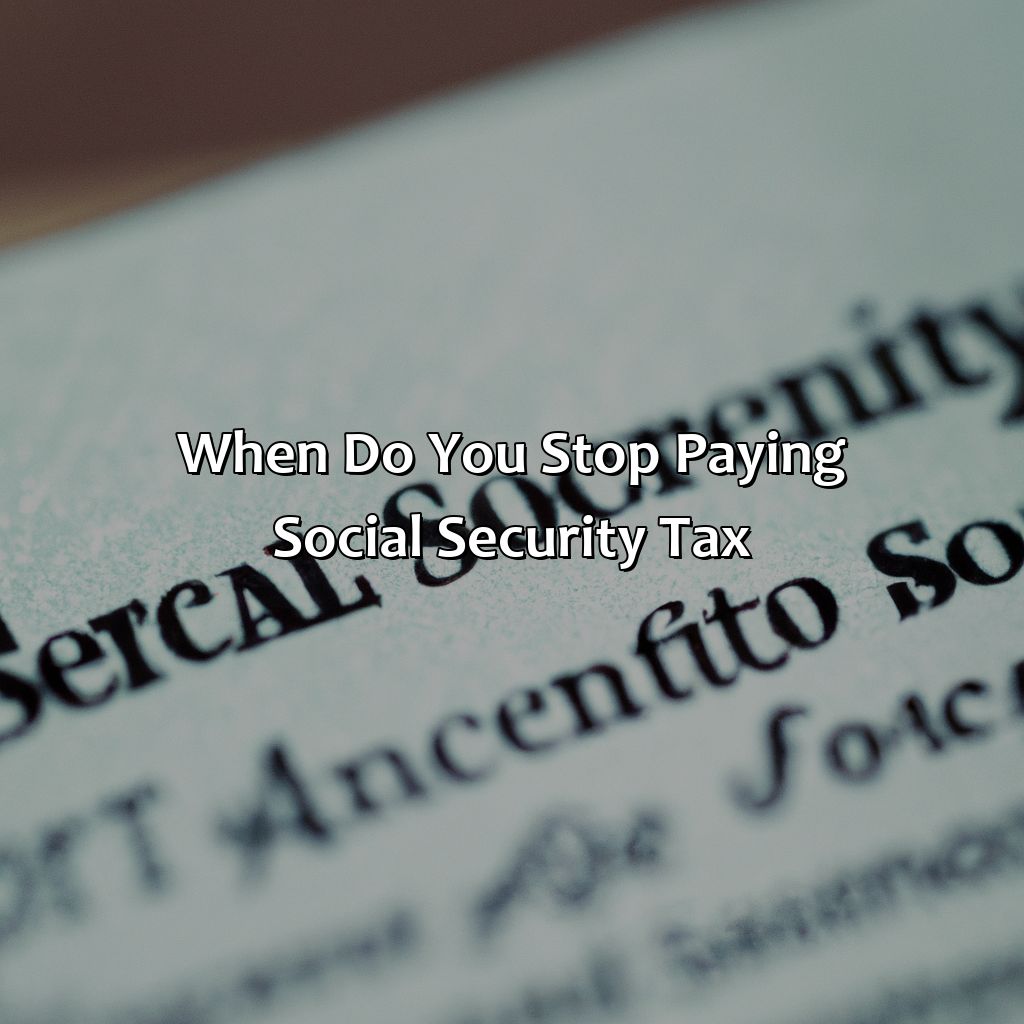When Do You Stop Paying Social Security Tax?
Key Takeaway:
- Retirement: Social Security tax payments typically stop when you reach full retirement age, which varies based on your birth year. At this point, you may receive Social Security benefits instead of paying into the system.
- Disability or Death: If you become disabled or pass away before reaching retirement age, Social Security tax payments may stop and your eligible dependents may receive benefits instead.
- Exceeding the Wage Base Limit: Each year, there is a wage base limit for Social Security tax payments. If you earn income above this limit, you may no longer have to pay Social Security tax for the remainder of the year.
Have you ever wondered when you stop paying social security taxes? As you approach retirement, it’s important to understand when you can stop contributing to this tax. You can get the answers you need to help plan for a financially secure retirement.
Explanation of Social Security Tax
Social Security Tax is a payroll tax deducted from employees’ wages and self-employed individuals’ earnings. The purpose of this tax is to provide retirement benefits, disability insurance, survivor benefits, and other benefits to eligible individuals.
The amount of Social Security Tax paid by individuals depends on their income level. In 2021, the tax rate is 6.2% for employees and 12.4% for self-employed individuals. This tax is levied on income up to a certain limit, which changes annually.
When an individual reaches full retirement age or becomes disabled, they may be eligible to receive Social Security benefits based on their work history and earnings record. These benefits are funded by the Social Security Tax paid during their working years.
It’s important to understand when you stop paying Social Security Tax because it can affect your eligibility for benefits and retirement planning. For most people, Social Security Tax stops being deducted once they reach the annual income limit set by the government. However, some specific circumstances allow for exemption from paying this tax.
For example, nonresident aliens with valid visas are generally exempt from paying Social Security Tax unless they meet certain criteria. Additionally, individuals who have opted out of the public retirement system in favor of private pension plans may be exempt from paying this tax.
In summary, Social Security Tax is a crucial aspect of the American social welfare system that provides financial support to retired and disabled individuals through payroll deductions made during their working years. Understanding when you stop paying this tax can ensure that you make informed decisions about your financial future.
Good news for the undead: you stop paying Social Security tax when you’re six feet under.
When do you stop paying Social Security Tax?
To figure out when you’ll stop shelling out Social Security Tax, consider Retirement, Disability or Death, and surpassing the Wage Base Limit. Here, we’ll go over these three areas simply and explain how they’re connected to ceasing payments for Social Security Tax.

Image credits: retiregenz.com by Adam Woodhock
Retirement
As one reaches the age of retirement, they may wonder when they can stop paying social security tax. Legally speaking, there is no upper age limit for contributing towards this tax. One pays this tax as long as they are earning an income and it is deducted from their paycheck by their employer.
However, once someone has reached a certain income threshold ($142,800 in 2021), they are no longer required to pay social security tax. Any earnings beyond this threshold do not incur the tax.
It is important to note that even if one has reached the threshold and is no longer paying social security tax, they will still be eligible to receive benefits upon retirement. These benefits depend on the number of years worked and the amount contributed towards social security during those years.
Ensure you stay informed about changes or updates in social security tax laws by keeping up with IRS publications or consulting a financial professional. Don’t miss out on potential benefits or incur penalties due to lack of knowledge on this important matter.
Disability or death may stop your payments to Social Security, but don’t worry, you won’t be able to enjoy those retirement benefits anyway.
Disability or Death
If an individual becomes disabled or dies, Social Security taxes may still need to be paid. In these cases, disability or survivor benefits may be available to the individual or their family members. The amount of taxes paid and the eligibility for these benefits will depend on the individual’s earnings record and circumstances. It is important to review the details with a Social Security representative or financial advisor to determine the best course of action.
In such situations, benefits can continue to be received by spouses, children, or other eligible dependents after a person is deceased. These benefits can help provide financial stability during difficult times and may also include access to Medicare coverage. Additionally, if an individual becomes disabled before reaching retirement age, they may also be eligible for disability benefits which can continue until they reach full retirement age.
It is crucial to have a solid understanding of Social Security tax regulations throughout one’s working years and beyond. Seeking guidance from a financial professional can help ensure that individuals are prepared for any unexpected events down the road and that their families are protected in case of disability or death. By staying informed and proactive about Social Security taxes and benefits, individuals can make sure that they are getting the most out of this important program.
When your paycheck hits the wage base limit, it’s like hitting a wall…a wall made of taxes and despair.
Exceeding the Wage Base Limit
After reaching a certain income threshold, you may Exceed the Maximum Taxable Earnings limit and no longer have to pay Social Security tax for the remainder of that year. In 2021, this wage base limit is set at $142,800. Any income beyond this amount is not subject to Social Security tax.
It’s important to note that while you won’t have to pay additional Social Security tax on any extra wages earned in the same year after exceeding the wage base limit, Medicare taxes will continue to apply. This means you’ll still need to pay a 1.45% Medicare tax on all additional earnings.
Remember that this wage base limit changes each year and can be subject to increased adjustments depending on various economic factors such as inflation. To stay informed about current levels and changes, keep up with official announcements from SSA or consult with your financial advisor for more guidance.
According to the Social Security Administration, over 96% of American workers are covered by Social Security protection.
Five Facts About When Do You Stop Paying Social Security Tax:
You stop paying Social Security taxes once you reach your full retirement age, which is between 66 and 67, depending on your birth year. (Source: Social Security Administration)
If you have reached your full retirement age, you can earn as much as you want without affecting your Social Security benefits. (Source: AARP)
If you retire before reaching your full retirement age, there are limits to the amount you can earn before your Social Security benefits are reduced. (Source: Social Security Administration)
Social Security taxes are paid on income up to a certain limit, which is $147,000 in 2022. (Source: Internal Revenue Service)
Certain types of income, such as investment income and rental income, are not subject to Social Security taxes. (Source: Nolo)
FAQs about When Do You Stop Paying Social Security Tax?
When do you stop paying social security tax?
As of 2021, you stop paying social security tax when you reach $142,800 in income for the year. This is known as the Social Security wage base.
Do I continue to pay Medicare tax after reaching the Social Security wage base?
Yes, there is no wage limit for Medicare tax. You will continue to pay 1.45% of your income towards Medicare tax, regardless of your income level.
What if I work multiple jobs and exceed the Social Security wage base?
If you exceed the Social Security wage base due to multiple jobs, you will receive a refund for any excess taxes paid when you file your tax return for that year.
Can I still receive Social Security benefits if I stop paying Social Security tax?
Yes, you can still receive Social Security benefits even if you stop paying Social Security tax. However, your benefit amount may be reduced if you do not have the required number of work credits.
Do self-employed individuals have to pay both the employer and employee portion of Social Security tax?
Yes, self-employed individuals are responsible for paying both the employer and employee portion of Social Security tax, which is a total of 12.4% of their income up to the Social Security wage base.
Are there any exceptions or exemptions to paying Social Security tax?
There are certain exemptions to paying Social Security tax, such as for certain religious groups and for certain nonresident aliens. However, most individuals are required to pay Social Security tax on their income.
 Checkout this IRS Loophole
Checkout this IRS Loophole 
